It was the low land prices that encouraged citizens to settle in Thoraipakkam in the 90s. More people chose to invest in homes in the locality with the boom in the IT sector around twenty years ago.
In 2011, when Thoraipakkam became one of the areas to be included in GCC limits, citizens here were excited. They hoped that this would bring them good roads, better drinking water supply and an underground drainage (UGD) system — all things they had been fervently waiting for.
Indeed, several schemes were soon rolled out, raising hope among residents. But most of the schemes that grabbed the headlines then remain on paper, far from completion.
The reply to an RTI from Chennai Metro Water Supply and Sewerage Board (CMWSSB) has revealed that both the Okkiyam Thoraipakkam water supply scheme and the Underground Drainage (UGD) projects — planned to be completed by July 2015 and March 2020 respectively — are still only in the preliminary stages of work.
A Francis, President, Federation of Thoraipakkam Residents Welfare Associations had filed the RTI to know the status of the work. “As a resident, I had pinned my hopes on these projects. Since we pay water and sewage tax, we have all rights to demand the basic infrastructure required for better urban living,” says Francis.
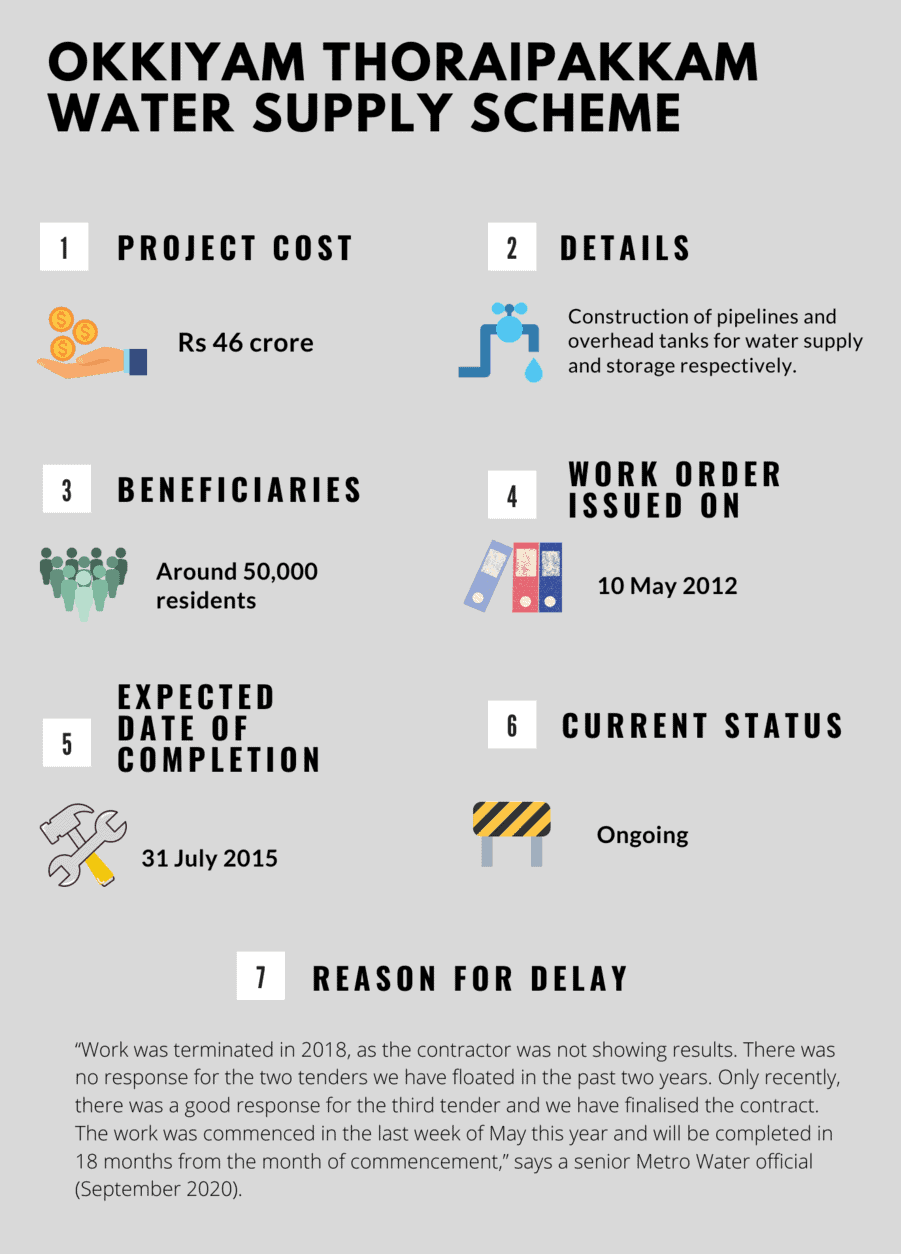
Once the project is completed, residents are supposed to receive water from the Nemmeli desalination plant. But the enthusiasm with which the Metro Water department had announced the launch of the projects has clearly waned.
What were the factors that caused the delay of these projects and how has it affected citizens?
Unusable groundwater
A major part of Thoraipakkam (Anand Nagar, Industrial Estate and MCN Nagar) lies close to the Perungudi dump yard. There is no study done yet to prove the link, but residents attribute the hard, dark groundwater here to the proximity of the dump yard. “We will soon be testing the water scientifically. What we know is that the water is very hard; the Total Dissolved Solids (TDS) level is above 1500 ppm,” says A Francis.
Many residents who wanted to get a Reverse Osmosis (RO) plant for their home have the same story to tell. “It is only then that we tested the water. With such TDS levels, we were advised not to go for RO plants,” says C Murugesan, who has been living here for the past 25 years.
The delay in execution of the water supply project and the poor quality of groundwater have left residents no choice but to depend on water tankers. During the non-summer months from September to January, a family of four in Thoraipakkam invests nearly Rs 3000 a month on tanker water. “When there is particularly high demand for water (as during the drought last summer), we end up spending more than Rs 7000 a month,” says Muthukumar Thangavel, a resident.
Status of the sewerage project
The storm water drains blocked with sewage speak volumes about the poor sewage network in Thoraipakkam. Every house relies on septic tankers and many of them connect their drainage network with storm water drains to avoid having to paying the tankers.
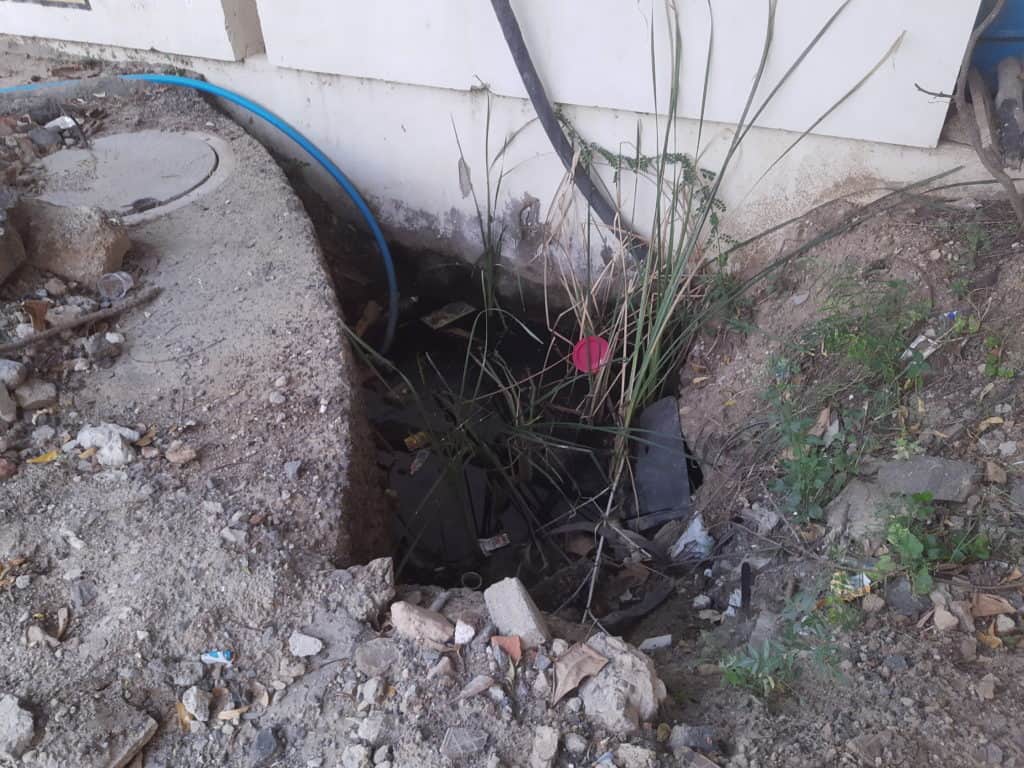
While public behaviour is not to be condoned, the situation also raises an important question: why doesn’t the locality have a connected drainage system? The project floated to provide for the same has sported the ‘work in progress’ tag for the past four years now.
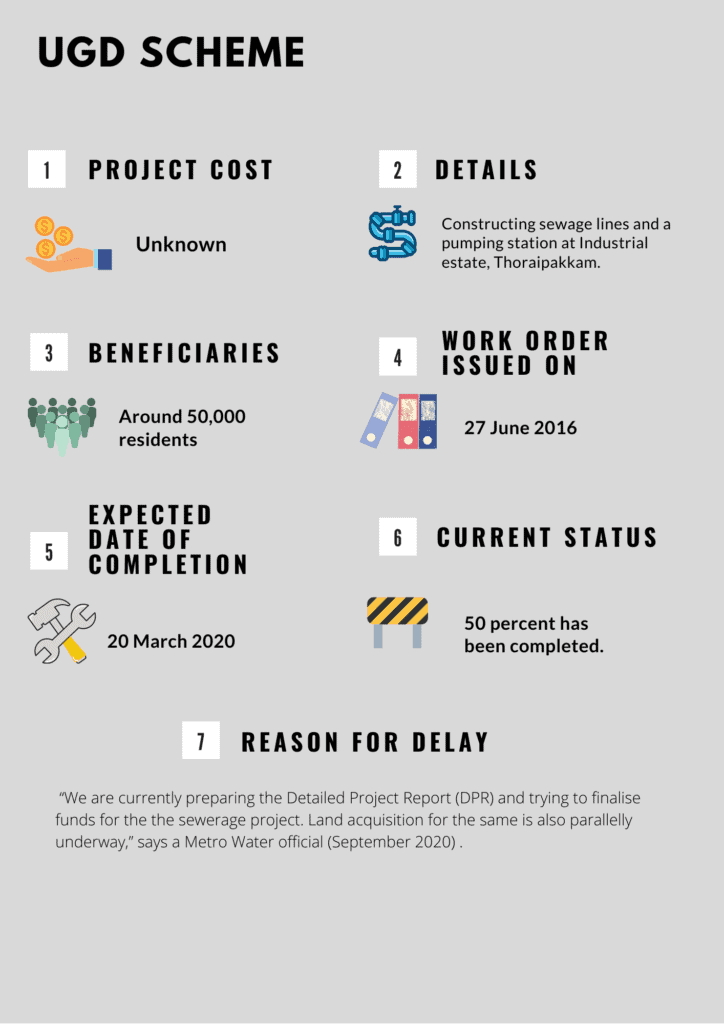
Metro Water officials are silent about the exact reasons behind the delay, even though they try to sound reassuring as seen in the quote above. However, workers on the job say that the contractor is yet to receive the funds for completing the job (laying the lines). Clearly, there are lapses in the implementation and financial management that are probably contributing to the delay.
The part of the sewage work that has been completed — construction of manholes — hardly solves any problems in the absence of pipelines and pumping station. If anything, it has led to more problems, as the following pictures illustrate:
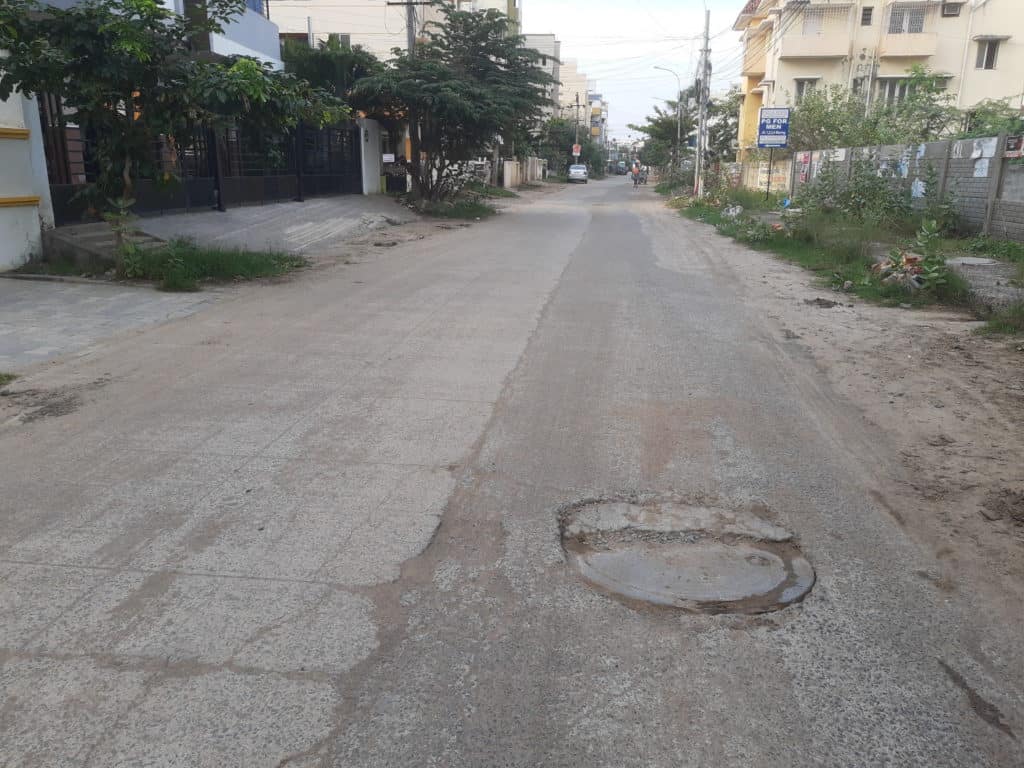
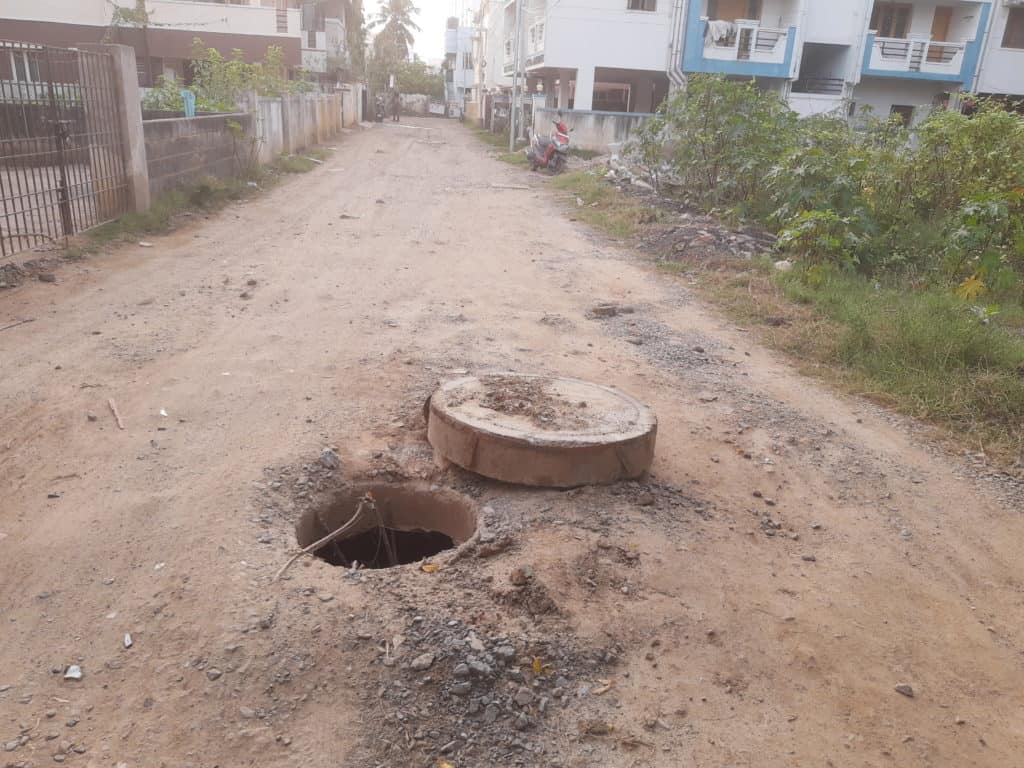
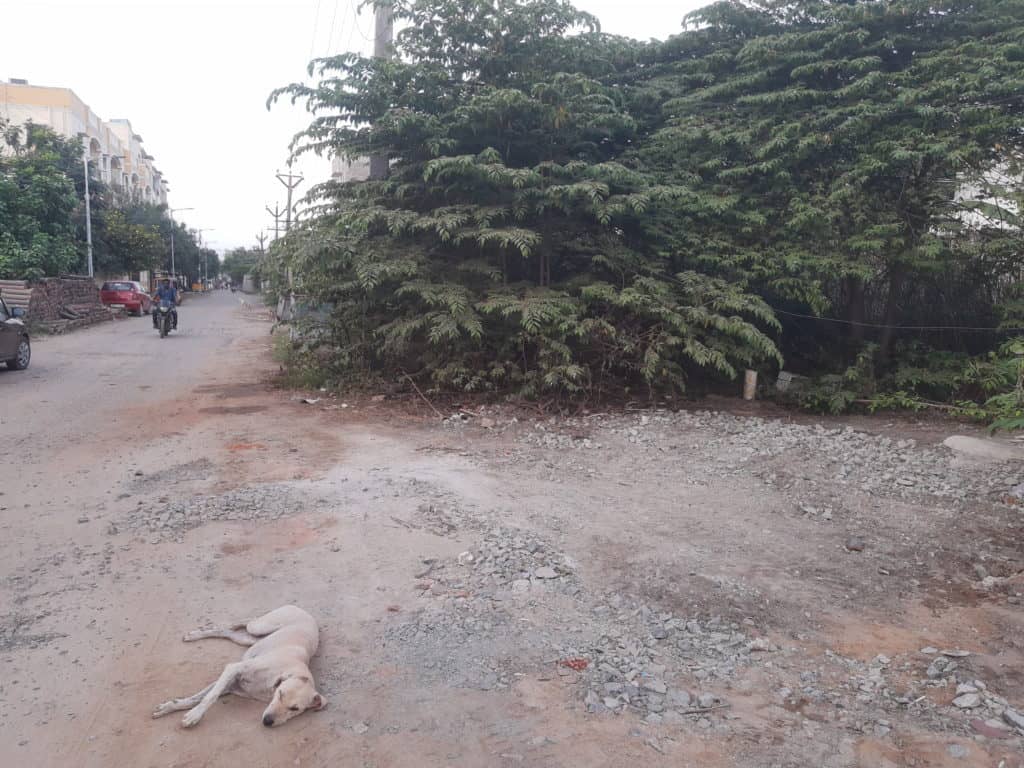
Setting up sewerage infrastructure
CMWSSB is the nodal agency for all projects on water supply and sewerage management in Chennai. CMWSSB relies on the Tamil Nadu government or different funding agencies such as the World Bank, Asian Development Bank etc for funds.
Once the funds are sanctioned, the department calls for tender applications through newspaper and online advertisements. Contractors who have experience in handling multi-crore projects and who have a record of quality are usually shortlisted. The least bid wins the contract.
Land acquisition is a time-taking procedure in the completion of such projects. Compensation for land owners varies from one project to another. If it is a state government funded project, the value is taken according to the rules of the Land Acquisition Act, 2013. The matrix is different for World Bank or Asian Development Bank funds.
Active citizenry plays an important role in the completion of these projects. In core areas of Chennai, where resident welfare associations are diligent in regularly meeting the elected representatives to explain the grievances, these projects tend to meet the deadlines.
“Otherwise, these projects succumb to official apathy and discrimination,” says Parameswari M, an active resident of Tambaram. It may be noted that the UGD project at Tambaram and Ambattur are yet to be completed.
The delay in the projects have had a direct effect on citizens who continue to spend money on drinking water and sewage treatment. “Once in four months, we pay Rs 850 for clearing the sewage (to tanker agencies),” says A Francis. It has also greatly degraded the livability of Thoraipakkam. Unfortunately, it appears that all that residents of the area can do is to wait to get their share of basic amenities.
good sir
not even one political opposition party taken this issue
because everybody is having septic tank lorry and water load lorries — how can they? they formed syndicate against the public
saminathan
kumaran kudil residents welfare associations secretary